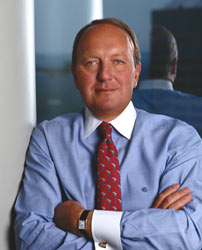Letter from the President,
Chief Executive Officer, and Chief Investment Officer
| Capital markets maintained a decidedly negative tone through UTIMCO's fiscal year 2002 as the economic and psychological aftershocks of September 11, 2001 continued to reverberate through worldwide economies and financial markets. During challenging periods diversification usually proves its value and last year was no exception. Despite the worst two year decline in the United States equities markets since 1974, UT System endowment funds suffered much smaller losses. The year was a time for introspection, restructuring, and affirmation of an investment policy which not only served UT System investments well last year, but which should allow us to take full advantage of the opportunities we expect during continuing challenges ahead. As UTIMCO celebrates its 6th anniversary serving the University of Texas System, we are confident that the sound investment policies currently in place, coupled |  |  |
| with the prudent and disciplined distribution policies established by the Board of Regents, will continue to provide the support essential to higher education in the State of Texas. |
Discipline is often a key strength in challenging times and in Fiscal 2002 discipline required sticking with sound diversification policies. The Permanent University Fund and other endowment funds managed by UTIMCO hold a broad array of financial assets including U.S. common stocks, international common stocks, U.S. and international bonds, private investment partnerships, real estate, hedge funds, and cash equivalents. Diversification pays because these asset categories typically have varying returns which act to moderate the overall volatility of portfolios holding a mix of the assets. Returns last year ranged from a loss of 16.6% in U.S. equities as measured by the Wilshire 5000 Index to a gain of 8.1% in U.S. bonds as measured by the Lehman Brothers Aggregate Index. In general, equity assets around the world suffered losses, while debt assets and cash equivalents recorded gains. Because of the long term nature of endowment assets, more than 80% of UT System endowment portfolios are dedicated to equity-like assets. As a result, it was virtually inevitable that the endowment funds would suffer losses last year, although sound diversification policies moderated the losses.
Losses in the endowment funds in Fiscal 2002 ranged from 7.35% in the Permanent University Fund to 6.96% in the General Endowment Fund. U.S. and international bonds as well as inflation hedge assets made positive contributions to total return, while common stocks of smaller U.S. companies suffered the largest losses. Despite the disappointing losses of the past two fiscal years, longer term growth in Permanent University Fund assets has compounded at an 8.44% annual rate over the past ten years. Distributions have also continued to increase. Following the constitutional amendment in 1999 which allowed a change in distribution policies, payments from the Permanent University Fund increased to $338.4 million in Fiscal 2002, an annual growth rate of more than 6.8% since 1998.
Unfortunately, we believe that we may continue to face challenging financial and economic market environments over the intermediate term. But as is always the case, the challenging environments will present opportunities as well. To take advantage of these opportunities, we have intensified our focus on what we term high value-added investment categories in the endowment portfolios. High value-added investments offer the opportunity for superior returns due to effective decisions by UTIMCO staff and external investment managers. These investments include active domestic and international public equities, private capital, hedge funds, and real estate. Although we will maintain the broad diversification that has served the funds well in the past, we expect our focus on high value-added opportunities to provide the margin of performance necessary to maintain or expand future distributions.
The intensified focus on high value-added investments has led to a change in management structure at UTIMCO. Four new Managing Director positions have been created to oversee specialized investment areas, while two additional Managing Director positions will oversee finance and accounting as well as information technology. In July, 2002, I appointed Cathy Iberg as Managing Director, Marketable Alternative Investments and Deputy Chief Investment Officer, and Sara McMahon and Trey Thompson as co-Managing Directors of Non-Marketable Alternative Investments. I also appointed Joan Moeller as Managing Director, Accounting, Finance and Administration, and Bill Edwards as Managing Director, Information Technology. This is the senior team that will work with me to guide UTIMCO through the challenges and opportunities of the future.
On a personal note, I want to say how pleased and honored I am to have the chance to return to Texas and to The University of Texas System. I also want to recognize the exceptional performance of Cathy Iberg as Interim President and Chief Executive Officer. She successfully guided UTIMCO though the most challenging period in its history. Cathy is an important part of the top management team here at UTIMCO and I look forward to her continuing valuable counsel. I am confident that with the thoughtful and dedicated UTIMCO Board of Directors and with a skilled staff focused on adding value, UTIMCO is well positioned to meet the future needs of its many constituents.
Bob L. Boldt, CFA
President, Chief Executive Officer, and Chief Investment Officer
